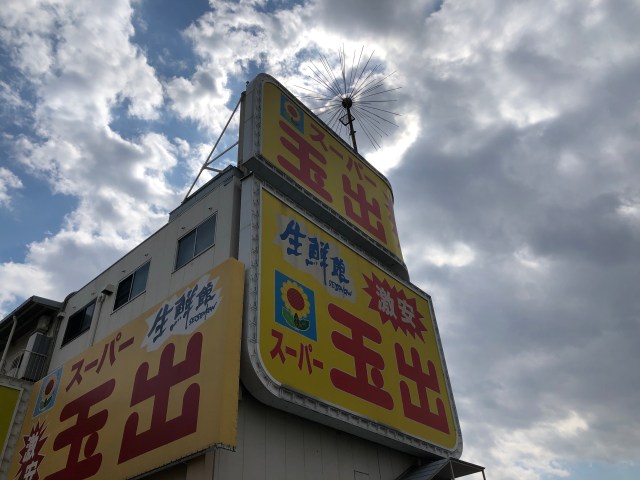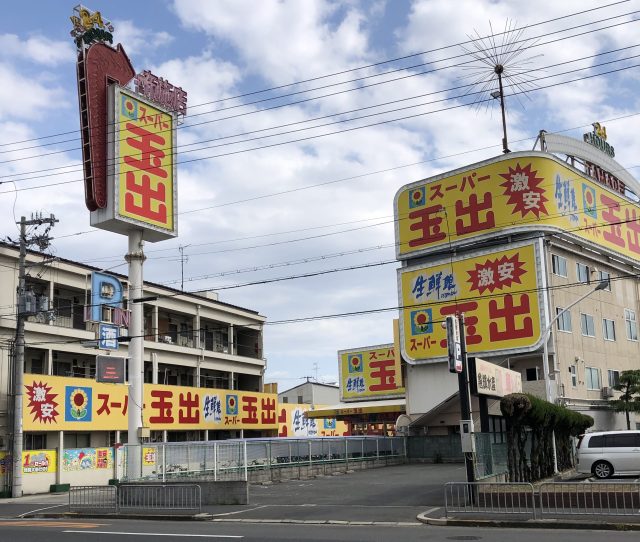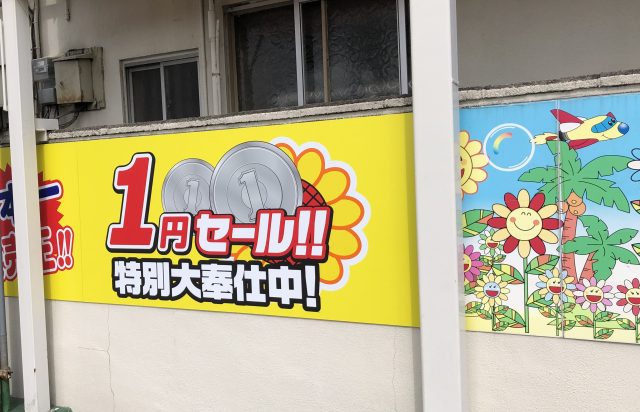
Hard lives are only getting harder.
At about 9 a.m. on 17 April a stabbing took place at a supermarket in Nishinari Ward, Osaka. On the same day, the market was offering a remarkable sale on masks in which anyone who spent over 1,000 yen (US$9) on groceries could also purchase two face masks for only one yen ($0.009).
Considering other instances of these rare items going on sale, most people would assume the stabbing was a part of a buying frenzy over some insanely cheap masks. But actually the suspect, a man in his 70s, had purchased some salad oil earlier that morning and got into an altercation with the staff while trying to exchange it, ultimately stabbing a clerk in the leg and fleeing the scene.
The fact that masks were being sold had nothing to do with it. Moreover, the supermarket didn’t even sell out of the masks during that sale and reportedly had dozens left over.
The supermarket in question is Super Tamade, a well-known chain found throughout Osaka and famous for its ostentatious appearance.
▼ At this location elsewhere in Osaka, the actual supermarket is just under that small awning in the middle of the photograph. The rest is just signage
It’s equally famous for its unbelievably low prices, something that makes it especially useful for the economically depressed area of Nishinari. Most residents or Nishinari are day laborers with the increasing elderly population involved in tokuso (special cleaning) which involves relatively light labor such as cleaning roads, weeding, or painting. However, because of the coronavirus, this work is becoming increasingly difficult.
▼ An example of tokuso
“Tokuso is strict,” one resident told Bunshun Online, “Before a job, if my temperature is over 37.5℃ (99.5℉), I can’t work. No one has come out [as positive] yet, but if even just one person does, it’s all over.”
Fearing that their already meager source of income could dry up at any moment, even the requirement of 1,000 yen for Super Tamade’s mask offer was too much for many residents to take up.
“Most customers look for the discounted items and buy some prepared foods and individual-size sake,” a clerk told Bunshun, “The average total is around 700 to 800 yen ($6.50 to $7.40). Many customers are trying their hardest just to get by, so there weren’t many who wanted to spend the 1,000 yen and ask for masks.”
▼ One-yen offers are a regular occurrence at Super Tamade, involving a range of items such as milk or eggs
After reading about this situation online, people all over Japan were understandably dismayed that this was happening inside their own country.
“It’s like news from hell…”
“I think we’ve become a developing country.”
“And there was a stabbing on the same day.”
“I really hope they get some government money soon.”
“That’s hard…”
“Why don’t they just buy enough for two trips at one time and get the masks?”
“Imagine 1,000 yen being too high of a hurdle.”
“I’ve been to Super Tamade, the stuff is so cheap, it’s actually difficult to spend 1,000 yen there.”
The people suggesting residents splurge that one time to get the masks are forgetting about the constant threat that their income will get shut off the moment anyone tests positive for COVID-19. Spending half a day’s budget at once is a very risky move in the realistic event that even more severe rationing might be needed in the future.
If there’s one silver lining to all this, it’s that the drop in tourism and commerce in general will likely stave off the gentrification that’s been happening in the area recently. However, to the people living there, it’s probably a matter of getting out of the frying pan and into the fire.
Source: Bunshun Online, Hachima Kiko
Photos ©SoraNews24
● Want to hear about SoraNews24’s latest articles as soon as they’re published? Follow us on Facebook and Twitter!



 Osaka burglar arrested because he couldn’t find a mask during shortage
Osaka burglar arrested because he couldn’t find a mask during shortage Face-mask-themed park “Tokyo Mask Land” coming to Yokohama
Face-mask-themed park “Tokyo Mask Land” coming to Yokohama Japanese tapioca bubble tea shops are suddenly becoming face mask shops
Japanese tapioca bubble tea shops are suddenly becoming face mask shops The fish in rural Fukui that rivals Japan’s most auspicious sea bream
The fish in rural Fukui that rivals Japan’s most auspicious sea bream Japanese restaurant chain serves Dragon Ball donuts and Senzu Beans this spring
Japanese restaurant chain serves Dragon Ball donuts and Senzu Beans this spring Japan Extreme Budget Travel! A trip from Tokyo to Izumo for just 30,000 yen [Part 2]
Japan Extreme Budget Travel! A trip from Tokyo to Izumo for just 30,000 yen [Part 2] Starbucks Japan releases new sakura goods and drinkware for cherry blossom season 2026
Starbucks Japan releases new sakura goods and drinkware for cherry blossom season 2026 7-Eleven Japan starts new temporary luggage storage service in over 300 branches
7-Eleven Japan starts new temporary luggage storage service in over 300 branches The town with Japan’s best castle also has one of Japan’s best breakfasts. Here’s where to eat it
The town with Japan’s best castle also has one of Japan’s best breakfasts. Here’s where to eat it First One Piece Day outside of Japan draws huge crowds
First One Piece Day outside of Japan draws huge crowds Hilarious Japanese commercial shows what happens when you beat the company president
Hilarious Japanese commercial shows what happens when you beat the company president Starbucks Japan releases first-ever Hinamatsuri Girls’ Day Frappuccino
Starbucks Japan releases first-ever Hinamatsuri Girls’ Day Frappuccino KFC Japan introduces a new burger 8 years in the making
KFC Japan introduces a new burger 8 years in the making Highest Starbucks in Japan set to open this spring in the Tokyo sky
Highest Starbucks in Japan set to open this spring in the Tokyo sky Tokyo Skytree turns pink for the cherry blossom season
Tokyo Skytree turns pink for the cherry blossom season Yakuzen ramen restaurant in Tokyo is very different to a yakuza ramen restaurant
Yakuzen ramen restaurant in Tokyo is very different to a yakuza ramen restaurant Japan Extreme Budget Travel! A trip from Tokyo to Izumo for just 30,000 yen [Part 1]
Japan Extreme Budget Travel! A trip from Tokyo to Izumo for just 30,000 yen [Part 1] Japan has only one airport named after a samurai, so let’s check out Kochi Ryoma【Photos】
Japan has only one airport named after a samurai, so let’s check out Kochi Ryoma【Photos】 Japanese drugstore sells onigiri at pre-stupid era prices, but how do they compare to 7-Eleven?
Japanese drugstore sells onigiri at pre-stupid era prices, but how do they compare to 7-Eleven? Burning through cash just to throw things away tops list of headaches when moving house in Japan
Burning through cash just to throw things away tops list of headaches when moving house in Japan Japan’s newest Shinkansen has no seats…or passengers [Video]
Japan’s newest Shinkansen has no seats…or passengers [Video] Foreigners accounting for over 80 percent of off-course skiers needing rescue in Japan’s Hokkaido
Foreigners accounting for over 80 percent of off-course skiers needing rescue in Japan’s Hokkaido Super-salty pizza sends six kids to the hospital in Japan, linguistics blamed
Super-salty pizza sends six kids to the hospital in Japan, linguistics blamed Starbucks Japan unveils new sakura Frappuccino for cherry blossom season 2026
Starbucks Japan unveils new sakura Frappuccino for cherry blossom season 2026 Foreign tourists in Japan will get free Shinkansen tickets to promote regional tourism
Foreign tourists in Japan will get free Shinkansen tickets to promote regional tourism The 10 most annoying things foreign tourists do on Japanese trains, according to locals
The 10 most annoying things foreign tourists do on Japanese trains, according to locals Take a trip to Japan’s Dododo Land, the most irritating place on Earth
Take a trip to Japan’s Dododo Land, the most irritating place on Earth Naruto and Converse team up for new line of shinobi sneakers[Photos]
Naruto and Converse team up for new line of shinobi sneakers[Photos] Is China’s don’t-go-to-Japan warning affecting the lines at a popular Tokyo gyukatsu restaurant?
Is China’s don’t-go-to-Japan warning affecting the lines at a popular Tokyo gyukatsu restaurant? Survey asks foreign tourists what bothered them in Japan, more than half gave same answer
Survey asks foreign tourists what bothered them in Japan, more than half gave same answer Japan’s human washing machines will go on sale to general public, demos to be held in Tokyo
Japan’s human washing machines will go on sale to general public, demos to be held in Tokyo Starbucks Japan releases new drinkware and goods for Valentine’s Day
Starbucks Japan releases new drinkware and goods for Valentine’s Day We deeply regret going into this tunnel on our walk in the mountains of Japan
We deeply regret going into this tunnel on our walk in the mountains of Japan Studio Ghibli releases Kodama forest spirits from Princess Mononoke to light up your home
Studio Ghibli releases Kodama forest spirits from Princess Mononoke to light up your home Major Japanese hotel chain says reservations via overseas booking sites may not be valid
Major Japanese hotel chain says reservations via overseas booking sites may not be valid Put sesame oil in your coffee? Japanese maker says it’s the best way to start your day【Taste test】
Put sesame oil in your coffee? Japanese maker says it’s the best way to start your day【Taste test】 No more using real katana for tourism activities, Japan’s National Police Agency says
No more using real katana for tourism activities, Japan’s National Police Agency says